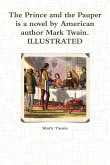The American is Henry James' comic novel about an uncultured but well-meaning young businessman from the USA, who travels to Europe and is amazed by what he finds. An illustrative example of humor in the later part of the 19th century, The American is a character-driven story about a man of commerce named Christopher Newman. Tired of the stresses and strains native to business in the USA, Newman decides to travel to Europe to seek adventure. On arrival, the beauties and sins of the Old World are both a shock and a thrill to the traveller, who despite a mixed reception from the peoples of the European continent remains nevertheless optimistic and driven to discovery. The novel is generally lighthearted in portraying the naivete and optimism of Newman for comic effect. However, Henry James more serious undertone was to illustrate that Americans - despite their lack of refined mannerisms - are essentially an optimistic, honest and driven people with much to offer the wider world.
Hinweis: Dieser Artikel kann nur an eine deutsche Lieferadresse ausgeliefert werden.
Hinweis: Dieser Artikel kann nur an eine deutsche Lieferadresse ausgeliefert werden.








